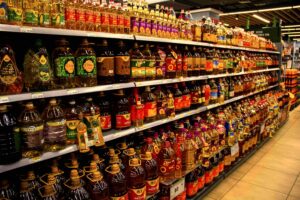Value Investing
If you’re looking at equities, NSE leads, but BSE offers niche opportunities. For commodities, MCX is the top choice, while NeML is revolutionizing rural markets with digital solutions.

Overview
Gokul Refoils & Solvent Ltd, Kaleesuwari Refinery Private Limited, Vimal Oil & Foods Ltd, and Adani Wilmar are prominent players in India’s edible oil industry. This comparison examines their business models, segments, future strategies, strengths, weaknesses, profit formulas, investors, customers, market capitalization, financial indicators, and more.
1. Business Models and Segments
Gokul Refoils & Solvent Ltd: Gokul Refoils focuses on the manufacturing and marketing of edible oils, including soybean oil, sunflower oil, mustard oil, and palm oil. It operates in both domestic and international markets, supplying bulk and consumer-packed oils.
Kaleesuwari Refinery Private Limited: Kaleesuwari primarily produces edible oils under the “Gold Winner” brand. It offers a variety of oils including sunflower, groundnut, and sesame oil. The company also deals in soap manufacturing and marketing.
Vimal Oil & Foods Ltd: Vimal Oil produces edible oils such as cottonseed oil, groundnut oil, and sunflower oil. The company also ventures into the production of de-oiled cakes and other food products.
Adani Wilmar: Adani Wilmar offers a broad range of products, including edible oils, wheat flour, rice, pulses, and sugar. Their flagship brand, Fortune, is well-known in the market. The company operates both in the FMCG sector and in industrial applications.
2. Future Strategies
Gokul Refoils & Solvent Ltd: Gokul Refoils plans to expand its refining capacity and increase its market share in both domestic and international markets. The company aims to diversify its product portfolio and focus on high-margin products.
Kaleesuwari Refinery Private Limited: Kaleesuwari is focusing on brand building and expanding its product range. The company aims to penetrate deeper into rural markets and enhance its distribution network to increase market reach.
Vimal Oil & Foods Ltd: Vimal Oil plans to invest in technology to improve production efficiency and product quality. The company also aims to expand its product offerings and enter new geographic markets.
Adani Wilmar: Adani Wilmar aims to strengthen its market position by diversifying its product portfolio and expanding its distribution network. The company focuses on innovation, sustainability, and tapping into rural markets to drive growth.
3. Strengths and Weaknesses
Gokul Refoils & Solvent Ltd:
Strengths:
Weaknesses:
Kaleesuwari Refinery Private Limited:
Strengths:
Weaknesses:
Vimal Oil & Foods Ltd:
Strengths:
Weaknesses:
Adani Wilmar:
Strengths:
Weaknesses:
4. Profit Formulas
Gokul Refoils & Solvent Ltd: Gokul Refoils’ profit formula relies on high-volume sales and efficient production processes. The company leverages economies of scale to maintain profitability in a competitive market.
Kaleesuwari Refinery Private Limited: Kaleesuwari’s profitability is driven by strong brand equity and premium pricing. The company focuses on high-margin products and efficient supply chain management.
Vimal Oil & Foods Ltd: Vimal Oil’s profit model is based on producing high-quality edible oils and maintaining competitive pricing. The company focuses on regional markets where it can leverage its brand loyalty.
Adani Wilmar: Adani Wilmar’s profit formula revolves around high-volume sales of essential commodities with competitive pricing. Their focus on economies of scale and efficient supply chain management aids in maintaining profitability despite thin margins.
5. Investors and Market Capitalization
Gokul Refoils & Solvent Ltd: Gokul Refoils is publicly traded, with a diversified investor base including institutional and retail investors. As of 2024, its market capitalization is approximately ₹21 billion.
Kaleesuwari Refinery Private Limited: Kaleesuwari is privately held, with investment primarily from the founding family and private investors. Precise market capitalization figures are not publicly disclosed.
Vimal Oil & Foods Ltd: Vimal Oil is a public company with significant institutional and retail investor participation. As of 2024, its market capitalization is about ₹5 billion.
Adani Wilmar: Adani Wilmar is a joint venture between the Adani Group and Wilmar International, with a market capitalization of approximately ₹423 billion as of 2024.
6. Customers and Market Presence
Gokul Refoils & Solvent Ltd: Gokul Refoils serves a broad customer base across India and international markets, focusing on both bulk and consumer-packed oils.
Kaleesuwari Refinery Private Limited: Kaleesuwari caters to urban and rural households in India, with a strong presence in the southern states. The company’s products are widely available in modern retail and traditional trade outlets.
Vimal Oil & Foods Ltd: Vimal Oil’s primary customers are in regional markets, with a focus on middle and upper-middle-class consumers. The company’s products are available in modern trade outlets and through e-commerce.
Adani Wilmar: Adani Wilmar serves a broad customer base across India, focusing on urban and rural households. The company’s extensive distribution network ensures deep market penetration.
7. Financial Indicators
Gokul Refoils & Solvent Ltd:
Kaleesuwari Refinery Private Limited:
Vimal Oil & Foods Ltd:
Adani Wilmar:
Conclusion
Gokul Refoils & Solvent Ltd, Kaleesuwari Refinery Private Limited, Vimal Oil & Foods Ltd, and Adani Wilmar are significant players in the edible oil industry, each with unique strengths and strategic approaches. Gokul Refoils excels in high-volume sales and international presence, Kaleesuwari in brand strength and product diversity, Vimal Oil in regional market focus and quality, and Adani Wilmar in essential commodities and market penetration. Their future strategies indicate continued growth and competition in the dynamic Indian FMCG market.
If you’re looking at equities, NSE leads, but BSE offers niche opportunities. For commodities, MCX is the top choice, while NeML is revolutionizing rural markets with digital solutions.
Mastek, Persistent Systems, KPIT, and Mphasis cater to different IT segments. KPIT leads in automotive software (high growth, expensive valuation). Persistent is strong in digital transformation, Mphasis in BFSI, and Mastek in cloud ERP (UK-focused). Persistent offers a balance of growth and valuation, while KPIT has industry tailwinds.
Kaveri Seeds, UPL, Bayer CropScience, and Rasi Seeds are key players in India’s agribusiness sector. Kaveri and Rasi dominate hybrid seeds, while UPL leads agrochemicals. Bayer excels in biotech but faces regulatory hurdles. UPL offers high growth but carries debt, while Kaveri and Bayer provide stable investment potential.